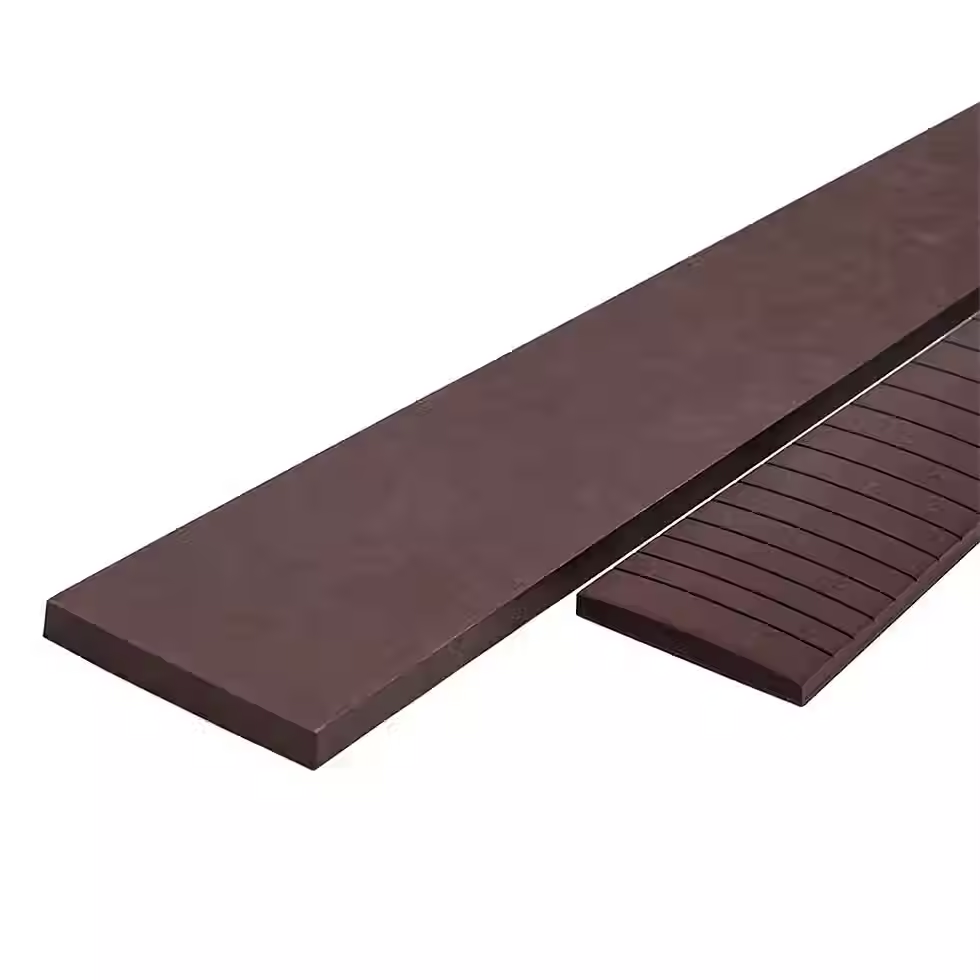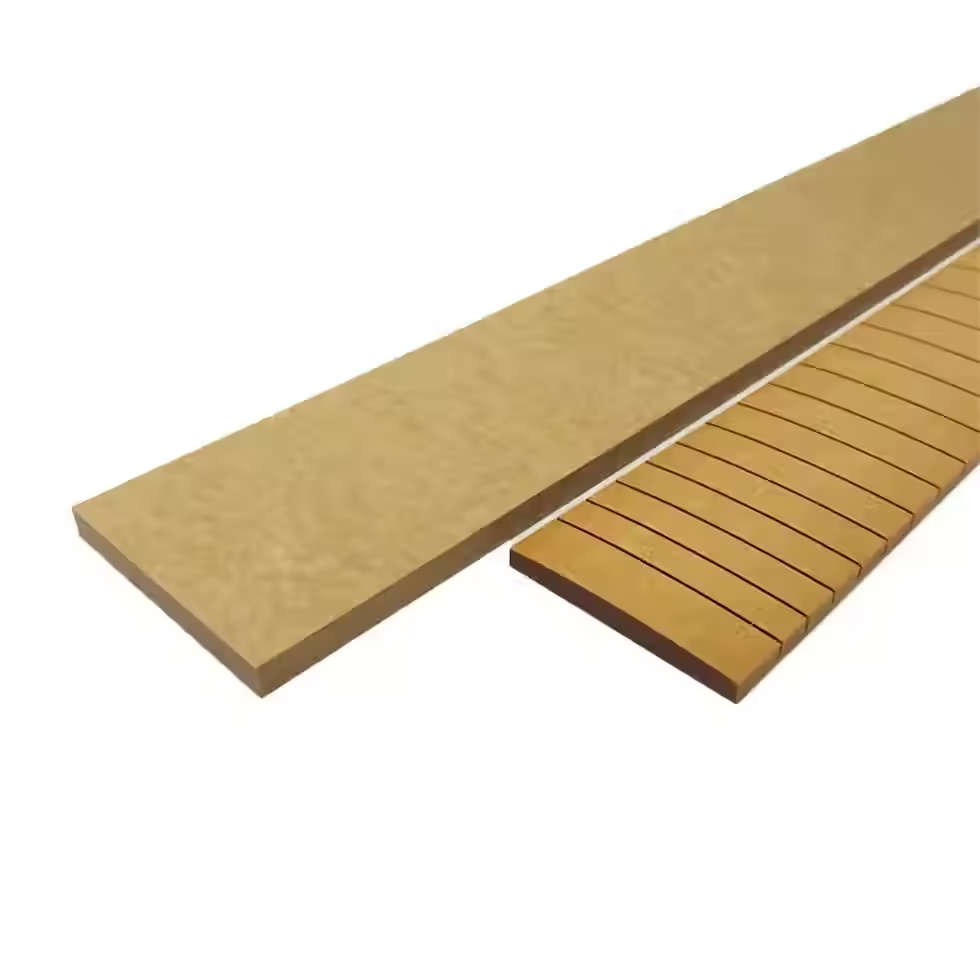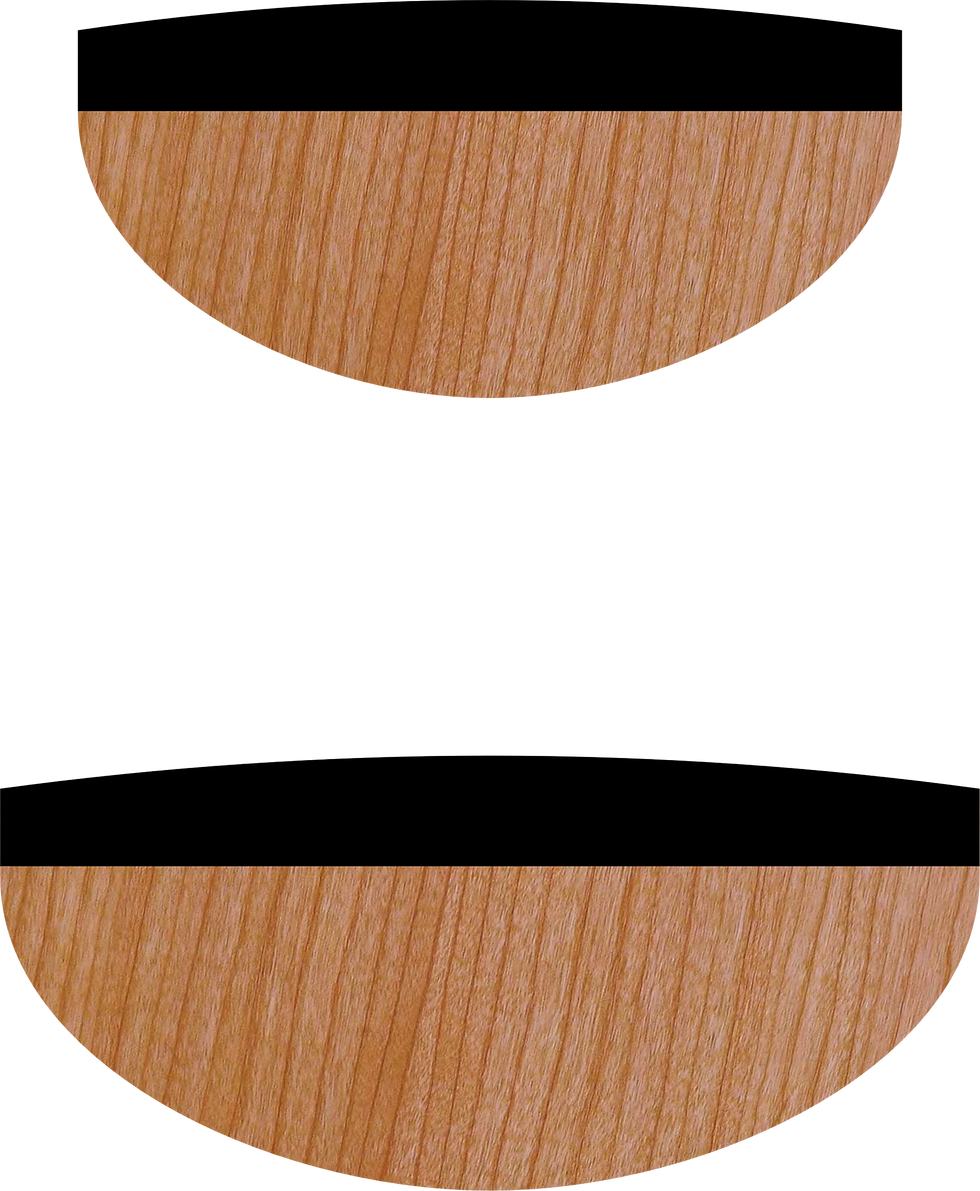
NECK DESIGN
Our guitar necks are designed for exceptional playability, stability, and comfort. Built with premium tonewoods like quartersawn maple, roasted maple, or mahogany, each neck is shaped with precise profiles—such as popular modern C, soft V, D-shape and asymmetrical shape—to suit a variety of hand sizes and playing styles. We offer both single-radius and compound radius options.
All necks are equipped with a dual-action truss rod and can be optionally reinforced with carbon fiber rods or KTS titanium rods, adding stiffness and enhancing tuning stability over time. We use precision Jescar and Hosco fretwire, available in multiple sizes and material such as Nickel, Stainless-Steel, and EVO Gold. The key player-focused features include comfortable rolled fingerboard edges. Customization inlay options may include a variety of design and material, as well as standard, abalone, pearl, and many more. We offer a special luminiscent side dots for enhanced visibility on dark stages—ensuring your guitar neck performs beautifully in every environment, or you can choose a standard side dot for vintage style.
Strength Meets Stability
Carbon & Titanium Neck Reinforcement System are designed for players who demand long-term stability without compromising tone. By combining ultra-rigid carbon fiber rods with a central titanium support channel, this system provides unmatched resistance to warping, twisting, and seasonal movement. The result is a neck that remains rock-solid under high tension and across shifting climates—ideal for touring musicians and extended-scale instruments.
This lightweight, non-intrusive solution minimizes the need for frequent truss adjustments and ensures that your instrument stays performance-ready in any environment. Available as a premium upgrade on all custom Markland builds.
Carbon Reinforcement
This type of reinforcement is popular and greatly reduces the chances of neck warping, twisting, or neck movement caused by seasonal humidity changes or string tension.
-
Lightweight yet incredibly strong
-
Helps maintain long-term neck stability
-
Adds rigidity without affecting resonance
-
Ideal for players in varying climates or who travel frequently

KTS Titanium Reinforcement
Titanium rods offer a slightly different feel: they contribute to a more responsive neck, with excellent note clarity and improved sustain, while also maintaining ultra-high stability.
-
Precision-machined from solid titanium
-
Adds clarity, sustain, and articulation to the neck
-
Incredibly durable and resistant to temperature and moisture changes
-
Favored by players who demand tonal precision and road-tested reliability

Whether it's carbon or titanium, both reinforcements are selected to suit the model and the playing needs of our customers. These design choices ensure that every Markland neck feels solid, plays comfortably, and stands the test of time.
Composite Fingerboards – Sustainable Performance with Richlite®
We’re proud to offer Richlite® composite fingerboards—a modern, environmentally responsible alternative to traditional hardwoods like ebony and rosewood. Richlite is a high-performance material that delivers exceptional durability, consistency, and acoustic quality while also supporting sustainable practices.
What is Richlite?
Richlite is a composite material made from recycled paper and resin, sourced from FSC®-certified, sustainably managed forests. Originally developed for industrial applications, Richlite has become a favorite in the guitar world for its reliability and tonal performance.
Why Choose Richlite?
-
Durability: Richlite is a dense, non-porous material that is resistant to moisture, heat, and impact. It does not expand or contract like wood, which can help prevent problems like warping, cracking, and splitting.
-
Consistency: Richlite is a man-made material, which means that it can be produced to consistent thickness and quality. Unlike wood, which can have natural variations in density, color, and grain, Richlite offers a reliable and uniform surface for fretboards.
-
Sustainability: Richlite is made from paper and resin, which are renewable resources. It does not require the cutting down of trees or contribute to deforestation. Additionally, Richlite can be recycled or repurposed at the end of its life.
A Future-Friendly Fingerboard
By choosing Richlite, you're not only investing in a high-performance playing surface—you’re also making a conscious decision to support sustainability in guitar craftsmanship.












The Scale Length: Playability, Tone Character, and Performance
Markland Guitarworks stands with confidence and dedication to designing instruments that aim to meet the needs of modern musicians. One of our key advantages lies in the variety of scale length options we offer.
Short scale : 24.625 inches – Offers a unique characteristic compared to the other short scale in the market.
Moderate scale : 25.25 inches – A casual medium scale category with an authentic character.
String Tension and Playing Comfort
-
The 25.25-inch scale provides a balance between string tension that is neither too tight nor too loose. This creates a comfortable playing experience, making it suitable for guitarists of various styles and experience levels.
-
On the other hand, the 24.625-inch scale has lower string tension, making it easier to bend the strings. This characteristic is more comfortable to play jazz and blues.
Tone Character and Sound
-
25.25-inch scale tends to produce a balanced tone with long sustain and a warm sound—also influenced by the tonewood, pickups, and construction.
-
24.625-inch scale provides a warmer, rounder tone with a balanced sustain. This mellow character is often favored in certain genres like blues or jazz.
Fret Spacing
On a 25.25-inch scale guitar, the fret spacing is one of a moderate level compared with 25.5". Guitars with a 24.625-inch scale have closer fret spacing, making it easier for players with smaller hands to access the fretboard. It’s also ideal for those who want to minimize the reach between note positions and lower string tension.
Guitar Neck Profiles: Comfortable in Hand, Optimized for Playability
The guitar neck profile refers to the shape and contour of the back of the neck, which greatly influences how comfortable the guitar feels in a player's hand.
C Shape
This is one of the most popular neck profiles found on guitars. It has a smooth curve resembling the letter "C" when viewed from the side. C-shaped necks are comfortable for many players and provide a balanced feel, making them versatile for various playing styles. Large C profile is refer to Vintage and Modern C have more ergonomic feel to player.
D Shape
D-shaped neck profile is similar to a C shape but has a slightly more pronounced curve on the back, resembling the letter "D". It can provide more support for the palm of the hand and is often preferred by players who like a bit more substance to hold onto.
V Shape
V-shaped neck profiles have a more angular contour, with the back of the neck shaped like a shallow "V". This profile can provide a more secure grip for the thumb and is favored by some players, especially those who play with a thumb-behind-the-neck technique.
U Shape
U-shaped neck profiles have a deeper and more pronounced curve on the back, resembling the shape of a letter "U". These necks tend to feel chunkier and provide more support for the hand, which can be comfortable for players with larger hands or those who prefer a substantial feel.
Asymmetric
Some guitars feature modern or compound neck shapes that combine elements of different profiles. For example, a neck might have a C shape near the nut (where the hand grips for chords) and transition into a flatter D shape higher up the neck (for faster playing and soloing).
Choosing the right neck profile is a matter of personal preference and comfort
By considering these factors and spending time trying out different guitars, you’ll be able to find the guitar neck profile that enhances your playing experience and feels like a natural extension of your hands.
NECK PROFILE

0.905" - 0.984"

0.846" - 0.925"

0.868" - 0.944"

0.905" - 0.984"

0.881" - 0.960"

0.885" - 0.964"
FRETWIRE SIZE CHART

57110
47104
55090
43080
57110
47104
55090
43080
: The most popular Jumbo fret wire.
: Common and popular medium jumbo fretwire size.
: Feel the popular 6105 fretwire as used by all the players over the years.
: Commonly use for acoustic guitars.







